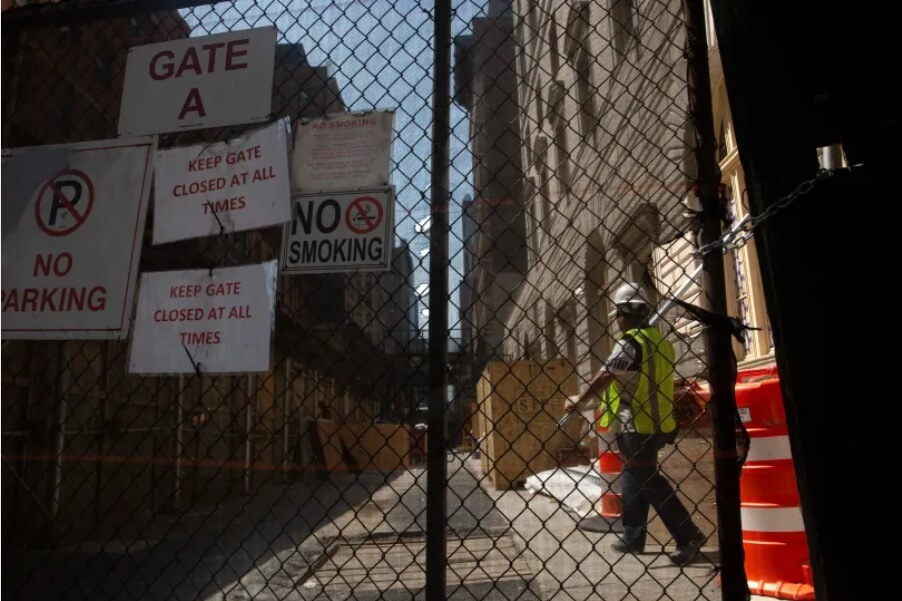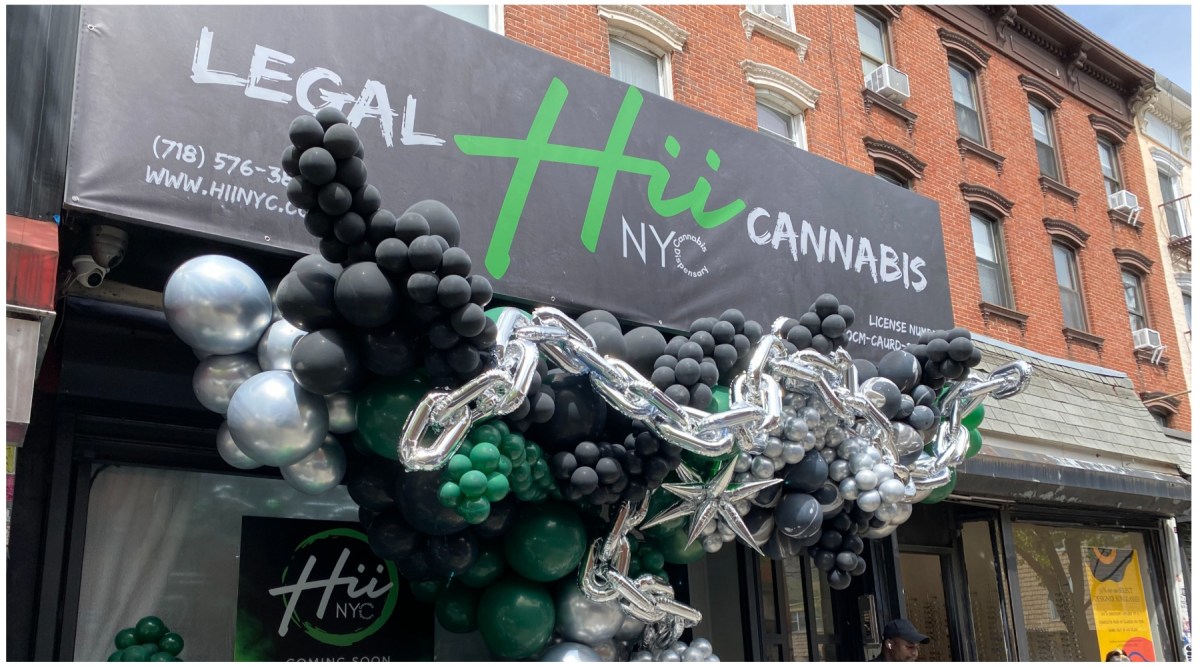This article was originally published on by THE CITY
Amid a drumbeat of demand for the creation of more housing in New York City, the mob is staging a potentially hazardous and costly comeback in the city’s construction business, where it has long been a sinister factor.
The evidence of its renewed involvement has quietly unspooled in a series of recent corruption prosecutions across the city involving significant affordable housing and high-rise hotel projects. Another case ended with the conviction of the head of the powerful state building trades council, who admitted taking $100,000 in bribes and was caught on tape consorting with mobsters.
All the cases present stark evidence of a shift by organized crime from corrupting union construction locals to aligning with nonunion contractors, including many that employ untrained workers and have lengthy records of on-the-job accidents, including fatalities. They also spotlight the sophisticated manipulation of government programs aimed at promoting the use of women and minority-owned businesses, as well as widespread cheating on workers’ compensation payments in schemes that have left injured employees without insurance protection.
Added up, they outline a series of risks — to safety, cost control and adherence to regulation — that mob interest in housing construction could pose to the widely advocated building projects endorsed in principle by Gov. Kathy Hochul and Mayor Eric Adams.
“They are getting back into construction, but it is all nonunion,” said Bruce Mouw, a former supervisory special agent for the FBI who helped bring down John Gotti. The mob has less clout on the city’s largest building sites, but it has found other advantages in the nonunion sector. “They can pay half the hourly rate, no fringe benefits, and screw a bunch of guys who often can’t speak English,” Mouw said.
In a corruption case filed last month by Manhattan District Attorney Alvin Bragg, an 82-year-old contractor whose regular visits to the East Harlem clubhouse of the late Genovese kingpin Anthony “Fat Tony” Salerno were spotted by the FBI is charged with orchestrating a series of frauds that won him lucrative carpentry contracts on affordable housing projects subsidized by city and state government.
/cdn.vox-cdn.com/uploads/chorus_asset/file/24561275/040423_bragg_trump_3.jpg)
During the investigation, prosecutors say, contractor Lawrence Wecker was overheard covering up injuries his employees suffered on the job. In one incident prosecutors cited in a court filing in support of the indictment, investigators intercepted a phone conversation in which Wecker was informed that a worker on a jobsite had broken his arm. “He don’t need no fucking doctor,” Wecker responded. “Let him sign in tomorrow…then at coffee time, take him out of the building…then when he goes to the hospital, he fell walking on the street.”
Wecker has pleaded not guilty to charges of enterprise corruption, including underlying counts of conspiracy, money laundering, grand larceny and insurance fraud.
Another case, filed by Bragg’s office in January, detailed an elaborate bid-rigging and kickback scheme involving nonunion subcontractors working on seven high-rise projects in Manhattan. According to the charges, participants raked millions of dollars off the top of those contracts, much of it routed to Frank Camuso, a reputed captain in the Gambino crime family, and two associates.
Several of the contractors who prosecutors allege paid kickbacks to Camuso have been cited repeatedly by city and federal authorities for perilous conditions at job sites where bricks toppled onto adjoining buildings and where accidents resulted in multiple worker injuries and at least three deaths.
Mob influence was also cited by federal prosecutors in the sentencing last month of one of the state’s most influential union leaders. James Cahill, the ex-president of the New York State Building and Construction Trades Council, was sentenced by a federal judge in Manhattan to 51 months in prison for taking more than $100,000 in bribes to allow contractors to avoid unions on their jobs, and for corrupting other union officials. Cahill, 74, a white-haired elder of the state’s labor establishment, worked alongside former Gov. Andrew Cuomo and other top political officials to engineer labor agreements covering the replacement to the Tappan Zee Bridge and other major projects.
/cdn.vox-cdn.com/uploads/chorus_asset/file/24692005/072815_james_cahill_1.jpg)
During the investigation, Cahill was seen meeting with high-level mobsters and was recorded bragging about his relationships with organized crime figures, including two captains in the Gambino crime family.
Referring to a reputed Gambino capo named Andrew Campos, Cahill said, “Andrew, he’s like the top guy right now. …I’m close with Andrew.”
At the time, Campos was under federal investigation for bribing developers to get contracts on multiple projects, including a luxury condo tower built alongside the High Line in West Chelsea. When Campos was sentenced in Brooklyn last year to 37 months in prison, Breon Peace, the U.S. attorney for New York’s Eastern District, said that the mobster’s schemes had “maintained the corrosive influence of organized crime in the construction industry.”
That influence emerged in another case as well. Michael “Mikey Nose” Mancuso, alleged boss of the Bonanno crime family, who is on supervised release after serving 15 years for a mob murder, told federal officials that he is just a working stiff who does clerical work with a construction firm that builds apartment houses in The Bronx. Yet conversations secretly recorded by an informant and unveiled in a current investigation reveal that in the spring of 2021, Mancuso had been discussing bidding on a scaffolding contract with a captain in another mob family, the Colombo group.
/cdn.vox-cdn.com/uploads/chorus_asset/file/24698663/mancuso_group_portrait_1.jpg)
For all their range, the crimes alleged in recent construction corruption cases are a far cry from the 1980s, when Mafia bosses colluded to rig bids on concrete delivery for almost every major project in the city, extorting 2% of the contract price from the winning bidder. Builders testifying at a 1987 trial said they had little choice but to comply since the extortion demands were delivered by a soldier in the Colombo crime family who, as president of the concrete workers union, had the power to shut down their jobs.
Monitors appointed by federal judges to supervise once mobbed-up unions have forced out most officials with alleged underworld ties. But even as the mob’s power has declined, it has found other advantages by working with smaller, less policed nonunion companies, said Mouw, the former FBI agent.
“They can play all kinds of games with their books,” he said. “If it is a union company, then the union sends in auditors to audit the payrolls. The companies have to pay back the benefits that they owe. These nonunion companies — forget about it.”
Attorneys for the defendants, including those representing Camuso and Wecker, did not respond to requests from THE CITY for comment. But Gerald McMahon, who represents an alleged Genovese crime family member, Christopher Chierchio, who has been charged in the Manhattan DA’s kickback indictment, dismissed the notion that the mob played an important role in his client’s case. “It is just a run-of-the-mill construction bribery case,” McMahon told THE CITY.
A Hard-Wired Connection
Evidence from the Mancuso investigation and the other recent cases displays the magnetic allure the contracting business has for mobsters and the powerful sway they exert in steering contracts to questionable builders.
In papers filed 10 days ago in Brooklyn federal court, prosecutors contended that Mancuso waited barely two years after finishing his 15-year sentence in 2019 before discussing bidding on a scaffolding contract with Vincent Ricciardo, who they identified as a captain in the Colombo organized crime family. The secretly recorded conversation was part of the evidence prosecutors from the Brooklyn U.S. attorney’s office presented after arresting Mancuso on charges of violating the terms of his supervised release by repeatedly meeting with other members of organized crime through much of 2021.
In his probation reports, Mancuso stated that he began work for a Bronx contractor, Value Construction, a week after he exited prison in April 2019. He also claimed to be working for another contractor based out of a home in North Bellmore, Long Island.
Value does facade work, demolition and roof waterproofing in apartment buildings around the city and has a track record of complaints about unsafe practices at several of its job sites, according to records of the city Department of Buildings.
Mancuso’s attorney, Stacey Richman, declined to discuss her client or his case.
The Bragg case involves charges of millions of dollars in kickbacks being delivered to Camuso, the alleged Gambino family capo, along with two of Camuso’s associates, through the brokering of Robert Baselice, who was identified as a senior executive at the Rinaldi Group, a New Jersey-based general contractor.
According to the charges, at least a dozen firms, all of which use nonunion labor, agreed to kick back an estimated $7 million to win subcontracts worth more than $100 million on several large projects. They include the Walker Hotel on Broadway in Tribeca, The FiDi Hotel on Stone Street in the financial district, and the Fifth Avenue Hotel at 250 Fifth Avenue.
In turn, Baselice (who uses a different spelling — Basilice — professionally) is charged with funneling more than $3.5 million of the kickback proceeds to Camuso, who owns several Staten Island businesses, and two of his associates.
The Rinaldi Group has not been accused or charged. “Mr. Baselice has not worked at the firm for more than a year,” said Edward Diskant, an attorney representing the firm. “We have cooperated fully with the district attorney.”
Injury and Death
Several of the contractors selected by Baselice have racked up lengthy records of safety violations while fostering dangerous conditions at job sites around the city, resulting in multiple worker injuries and three deaths. In some cases, tools and construction debris have toppled onto adjacent properties.
Since 2015, records show, the Department of Buildings and the federal government have responded to hundreds of complaints from workers and neighbors at many of the sites referenced in the mob kickback indictment. Agencies have leveled more than 1,100 violations and tens of thousands of dollars in fines to seven of the indicted contractors, the records show.
At a 32-story hotel on West 28th Street, for instance, DOB fielded 17 complaints, including 311 calls about a 10-foot ladder falling from the 30th floor, a tool striking an air conditioner in an adjacent building, and construction debris crashing into a neighbor’s living room.
Three of the indicted firms have particularly troubled safety histories: Bronx-based Everest Scaffolding, Manhattan-based Alba Services, and Queens-based Northeast Interior Services and its affiliate, Nordest.
Since 2015, DOB has hit Everest with 674 code violations and $581,000 in penalties; Alba has received 401 citations and $599,000 in penalties, and Northeast and Nordest have been cited for a combined 146 violations and $255,000 in penalties.
In 2020, a 21-year-old laborer fell to his death at an Everest site in Williamsburg, Brooklyn, where a seven-story condo building was going up. The worker stepped onto an uncompleted tier of the scaffolding and fell 48 feet to his death, records show. Two of the incidents at Northeast Interior Services and an affiliate, Nordest, were just as grim.
One worker died and another was seriously injured in 2020 when a fire extinguisher exploded inside a Postal Service facility on Ninth Avenue being converted to office space. In 2015, two Northeast laborers were buried in debris when a floor collapsed during construction of a hotel on West 38th Street in Midtown. One worker was killed and the other suffered back injuries and a broken foot.
/cdn.vox-cdn.com/uploads/chorus_asset/file/24698786/2015_construction_death_1.jpg)
Christopher Downes, owner of Everest and another firm, Upright Hoisting, won over $4 million in subcontracts and change orders arranged by Baselice, funneling back $305,000 to firms connected to Baselice, prosecutors say. Those firms then allegedly steered funds to shell companies set up by Camuso.
Downes’ attorney, Ken Aronson, did not return THE CITY’s call. An employee who answered the phone listed for Everest said no one with the name Christopher Downes worked there. A message left at Upright Hoisting was not immediately returned.
According to the kickback indictment brought by Bragg, Northeast and its affiliate obtained more than $1 million in demolition subcontracts with Baselice’s help, funneling $75,000 to firms that steered it to Camuso. The companies’ owner, Franco Caliendo, and his attorney, Joseph DiBenedetto, declined to comment. Also declining to comment were the owner and attorney representing Alba Services, which is accused of kicking back $200,000 to firms that funneled funds to Camuso’s shell companies, prosecutors say. At an Alba demolition site last year, two workers fell 10 to 15 feet, with one suffering brain damage.
Both Everest and Alba have been cited for failing to ensure that their workers have the required city safety certifications.
“We met one worker who went straight from making pizzas to working for one of the most dangerous demolition contractors in our city,” Mike Vatter, lead organizer for the union Laborers’ Local 79, told THE CITY.
Local 79 has repeatedly accused Alba and Northeast of cheating workers out of overtime and discouraging them from filing workers compensation claims.
“We know that wage theft and worker accidents often go hand in hand,” said Chaz Rynkiewicz, the local’s vice president. “No worker should have to face the choice between losing their job or losing their life.”
Milking Affordable Housing
One of the recent indictments also describes how the mob quietly insinuates itself into the construction of affordable housing. The effort was allegedly piloted by Wecker, a veteran practitioner of corrupt construction schemes who has prior convictions in state and federal court for similar crimes.
More than two decades ago, Wecker was charged in a sweeping indictment brought by then-Manhattan DA Robert Morgenthau that included the reputed boss of the Luchese crime family and several other mob figures. Wecker, who was described as an associate of both the Luchese and Genovese crime families, pleaded guilty in 2001 and was sentenced to 16 months in prison.
According to charges leveled last month by Bragg, Wecker later went back to his old trade, directing an array of scams that allowed his drywall and carpentry firm to reap millions by paying bribes, shortchanging his employees on wages and workers’ compensation insurance, and falsely claiming to employ minority- and women-owned businesses as subcontractors.
The schemes, which began in 2015 according to the indictments, were apparently successful. Wecker’s nonunion firm JM3 Construction landed multimillion-dollar contracts with at least eight large affordable housing projects located in Manhattan, Brooklyn and The Bronx. The projects include a 437-apartment building on Fountain Avenue in East New York, and a 110-unit building on East Sixth Street in the East Village. Much of Wecker’s workforce consisted of subcontractors that employed immigrant laborers who were paid in cash and whose undocumented status was unreported to project developers, according to the DA’s charges.
In order to qualify for contracts that required the inclusion of minority- or women-owned businesses, Wecker allegedly created a fake company operated by a woman named Lisa Rossi, who was charged along with seven other defendants. Rossi appeared to be clear about her role. During the investigation, she was recorded complaining to Wecker, “Stop telling people I’m an owner. I’m a pass-through.”
Rossi’s attorney, Lawrence DiGiansante, did not return calls.
Investigators executing a search warrant at Wecker’s home discovered more than just records of his alleged schemes: They spotted a loaded .38 caliber revolver. The find resulted in an additional charge of criminal possession of a weapon.
In announcing Wecker’s indictment, Bragg made a reflection that could have applied to any of the cases in the string of corruption prosecutions: “The common factor in all of these alleged schemes is greed at all costs.”
THE CITY is an independent, nonprofit news outlet dedicated to hard-hitting reporting that serves the people of New York.



















